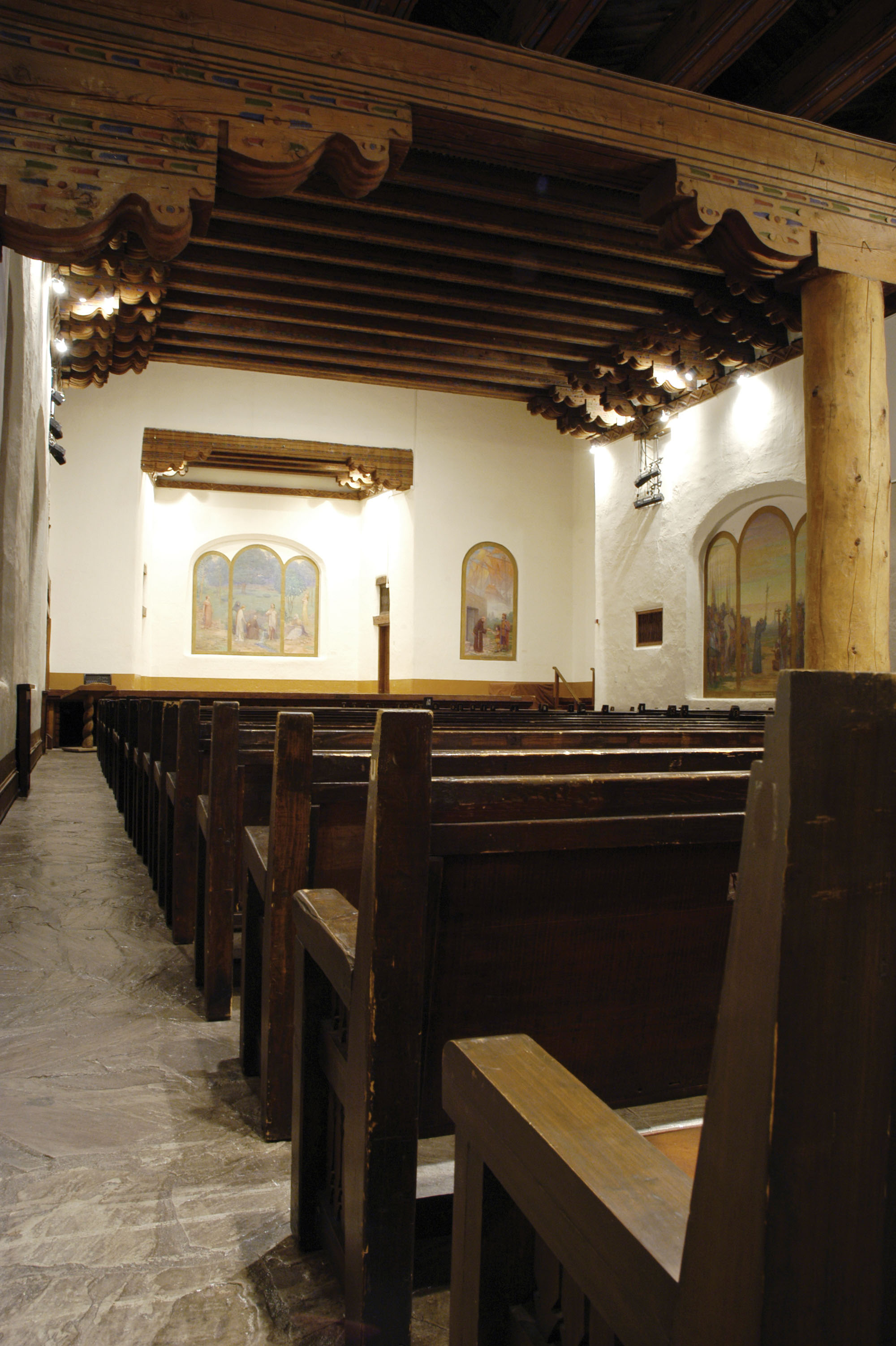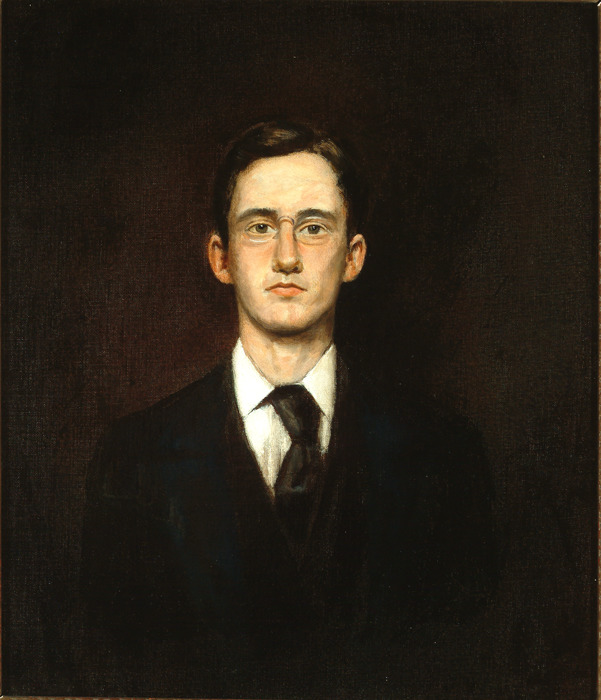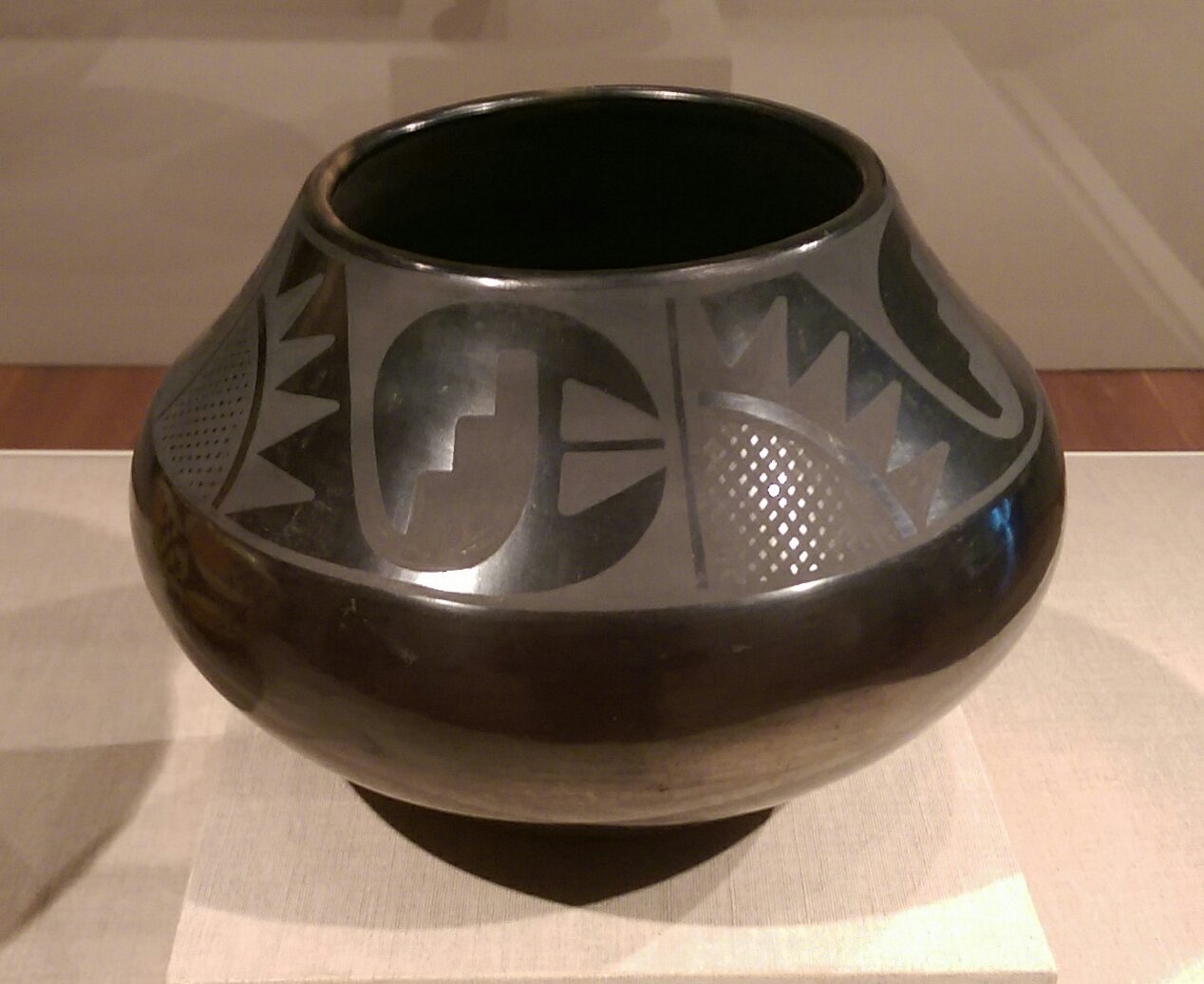|
Museum Of Fine Arts, Santa Fe
The New Mexico Museum of Art is an art museum in Santa Fe governed by the state of New Mexico. It is one of four state-run museums in Santa Fe that are part of the Museum of New Mexico. It is located at 107 West Palace Avenue, one block off the historic Santa Fe Plaza. It was given its current name in 2007, having previously been referred to as The Museum of Fine Arts. History The building was designed by architect Isaac Rapp and completed in 1917. It is an example of Pueblo Revival Style architecture, and one of Santa Fe's best-known representations of the synthesis of Native American and Spanish Colonial design styles. The façade was based on the mission churches of Acoma, San Felipe, Cochiti, Laguna, Santa Ana and Pecos. Collections The museum’s art collection includes over 20,000 paintings, photographs, sculptures, prints, drawings and mixed-media works. Notable artists in the collection include Ansel Adams, Gustave Baumann, Brian O'Connor, Georgia O'Keeffe, ... [...More Info...] [...Related Items...] OR: [Wikipedia] [Google] [Baidu] |
Santa Fe, New Mexico
Santa Fe ( ; , Spanish for 'Holy Faith'; tew, Oghá P'o'oge, Tewa for 'white shell water place'; tiw, Hulp'ó'ona, label=Tiwa language, Northern Tiwa; nv, Yootó, Navajo for 'bead + water place') is the capital of the U.S. state of New Mexico. The name “Santa Fe” means 'Holy Faith' in Spanish, and the city's full name as founded remains ('The Royal Town of the Holy Faith of Saint Francis of Assisi'). With a population of 87,505 at the 2020 United States census, 2020 census, it is the List of municipalities in New Mexico, fourth-largest city in New Mexico. It is also the county seat of Santa Fe County. Its metropolitan area is part of the Albuquerque, New Mexico, Albuquerque–Santa Fe–Las Vegas, New Mexico, Las Vegas Albuquerque–Santa Fe–Las Vegas combined statistical area, combined statistical area, which had a population of 1,162,523 in 2020. Human settlement dates back thousands of years in the region, the placita was founded in 1610 as the capital of . It replace ... [...More Info...] [...Related Items...] OR: [Wikipedia] [Google] [Baidu] |
Brian O'Connor (artist)
Brian O'Connor (March 2, 1958 – August 15, 2022) was an American visual artist, who worked in a surrealistic style. A documentary film, ''Painting Grey,'' was made about his work and life. He lived and collaborated with his wife, Iva, in the small town of Veguita, New Mexico. Early life and education O'Connor was born on March 2, 1958 to Mikey and John O'Connor, in Albuquerque, New Mexico, where he was also raised. He attended college in the late 1970s at the Centro Andino in Quito, Ecuador, where he first became interested in art. In 1983 he received a Bachelors of Fine Arts degree from the University of New Mexico. Career O'Connor's paintings have been described as socio-political narratives. He renders figurative subjects within enigmatic situations. O'Connor has described his work as "the beautiful mess" of "grappling with the world" and attempting to make sense of it. The art writer, Diane Armitage wrote of O'Connor's work, “O’Connor is a gifted realist painter whose i ... [...More Info...] [...Related Items...] OR: [Wikipedia] [Google] [Baidu] |
Kenneth M
Kenneth is an English given name and surname. The name is an Anglicised form of two entirely different Gaelic personal names: ''Cainnech'' and '' Cináed''. The modern Gaelic form of ''Cainnech'' is ''Coinneach''; the name was derived from a byname meaning "handsome", "comely". A short form of ''Kenneth'' is '' Ken''. Etymology The second part of the name ''Cinaed'' is derived either from the Celtic ''*aidhu'', meaning "fire", or else Brittonic ''jʉ:ð'' meaning "lord". People :''(see also Ken (name) and Kenny)'' Places In the United States: * Kenneth, Indiana * Kenneth, Minnesota * Kenneth City, Florida In Scotland: * Inch Kenneth, an island off the west coast of the Isle of Mull Other * "What's the Frequency, Kenneth?", a song by R.E.M. * Hurricane Kenneth * Cyclone Kenneth Intense Tropical Cyclone Kenneth was the strongest tropical cyclone to make landfall in Mozambique since modern records began. The cyclone also caused significant damage in the Comoro Islands an ... [...More Info...] [...Related Items...] OR: [Wikipedia] [Google] [Baidu] |
Carlos Vierra
Carlos Vierra (October 3, 1876 – 1937) was an American painter, illustrator and photographer of Portuguese descent. Early life Carlos Vierra was born and raised in Moss Landing, California near Monterey by his father, Portuguese sailor, Cato Vierra and his mother, Maria de Fratas. Vierra went to school in Monterey, California and had a hard time deciding between a life at sea and art. He studied art at the Mark Hopkins Institute (now the San Francisco Art Institute) under Gottardo Piazzoni in the 1890s, until he was twenty-five. Wanting to further his studies, Vierra took a six-month trip around Cape Horn to New York City. Once there, he worked hard to become an illustrator, a growing artistic field. In time, his art began to comfortably sustain him, though only for a short time. In 1904, at age twenty-eight, Vierra contracted tuberculosis and, at the advice of his doctor, relocated to Santa Fe, New Mexico. Vierra decided to live in a remote, small cabin along the Pecos River ... [...More Info...] [...Related Items...] OR: [Wikipedia] [Google] [Baidu] |
Santa Fe Community Orchestra
Santa Claus, also known as Father Christmas, Saint Nicholas, Saint Nick, Kris Kringle, or simply Santa, is a legendary figure originating in Western Christian culture who is said to bring children gifts during the late evening and overnight hours on Christmas Eve of toys and candy or coal or nothing, depending on whether they are "naughty or nice". In the legend, he accomplishes this with the aid of Christmas elves, who make the toys in his workshop, often said to be at the North Pole, and flying reindeer who pull his sleigh through the air. The modern figure of Santa is based on folklore traditions surrounding Saint Nicholas, the English figure of Father Christmas and the Dutch figure of ''Sinterklaas''. Santa is generally depicted as a portly, jolly, white-bearded man, often with spectacles, wearing a red coat with white fur collar and cuffs, white-fur-cuffed red trousers, red hat with white fur, and black leather belt and boots, carrying a bag full of gifts for childr ... [...More Info...] [...Related Items...] OR: [Wikipedia] [Google] [Baidu] |
Santa Fe Chamber Music Festival
The Santa Fe Chamber Music Festival is a six-week-long summer Festival of chamber music held annually in July and August and located in Santa Fe, New Mexico. It was founded in 1972 and presented its first series of concerts in 1973. Well-known musicians and young performers appear each season in concerts presented in the St. Francis Auditorium and the restored Lensic Theater. In its inaugural year Pablo Casals acted as honorary president. The Festival has contributed to the contemporary chamber music repertoire by commissioning 38 pieces from well-known composers, including Aaron Copland, Ned Rorem, Ellen Taaffe Zwilich, and John Harbison. The festival's executive director is Steven Ovitsky. Marc Neikrug has been artistic director since the late 1990s. Participating musicians in the festival's history included Yuja Wang, Walter Trampler and Andre-Michel Schub. Majovenuesinclude Lensic Performing Arts Center and St. Francis Auditorium in New Mexico Museum of Art. A radio ser ... [...More Info...] [...Related Items...] OR: [Wikipedia] [Google] [Baidu] |
Taos Society Of Artists
The Taos Society of Artists was an organization of visual arts founded in Taos, New Mexico. Established in 1915, it was disbanded in 1927. The Society was essentially a commercial cooperative, as opposed to a stylistic collective, and its foundation contributed to the development of the tiny Taos art colony into an international art center. Beginning Joseph Henry Sharp, who made paintings of Native Americans throughout his life, visited Taos on a trip through New Mexico in 1893. While there he became interested in the people of the Taos Pueblo and the landscape,James (1920), p. 373 an interest he shared with Ernest Blumenschein when they were studying art in Paris. Having heard of the degree to which Sharp was interested in painting the western United States, and the Indian pueblo of Taos in particular, Blumenschein came to Taos with fellow artist Bert Phillips in 1898. Planning only to visit Taos, they became so enamored by the Taos Valley and its people that they decided to stay ... [...More Info...] [...Related Items...] OR: [Wikipedia] [Google] [Baidu] |
Los Cinco Pintores
Los Cinco Pintores ("The Five Painters") was a group of early 20th-century artists in Santa Fe, New Mexico that included Will Shuster, Fremont Ellis, Walter Mruk, Jozef Bakos, and Willard Nash. By 1921, Shuster, Ellis, Mruk, Bakos, and Nash had all moved to Santa Fe, and the five formed their artist collective in 1921. At the time, the five painters were all in their 20s and new to Santa Fe. Their stated goal was to "take art to the people" by exhibiting in places such as schools, hospitals, factories, and even the New Mexico Penitentiary. In December of that year, the New Mexico Museum of Art presented the first of several exhibitions as a group. In addition to their Midwestern Touring Exhibit in 1922, they also arranged a show in Los Angeles in 1923 call "Exhibition of Painting by Artists of New Mexico". These modernist painters were inspired by New Mexican people and landscapes for their subject matter. They formally disbanded in 1926. See also * Taos Society of Artists T ... [...More Info...] [...Related Items...] OR: [Wikipedia] [Google] [Baidu] |
Ashcan School
The Ashcan School, also called the Ash Can School, was an artistic movement in the United States during the late 19th-early 20th century that produced works portraying scenes of daily life in New York, often in the city's poorer neighborhoods. The artists working in this style included Robert Henri (1865–1929), George Luks (1867–1933), William Glackens (1870–1938), John Sloan (1871–1951), and Everett Shinn (1876–1953). Some of them met studying together under the renowned realist Thomas Anshutz at the Pennsylvania Academy of the Fine Arts; others met in the newspaper offices of Philadelphia where they worked as illustrators. Theresa Bernstein, who studied at the Philadelphia School of Design for Women, was also a part of the Ashcan School. She was friends with many of its better-known members, including Sloan with whom she co-founded the Society of Independent Artists. The movement, which took some inspiration from Walt Whitman's epic poem ''Leaves of Grass'', has bee ... [...More Info...] [...Related Items...] OR: [Wikipedia] [Google] [Baidu] |
Maria Martinez
Maria Montoya Martinez (1887, San Ildefonso Pueblo, New Mexico – July 20, 1980, San Ildefonso Pueblo) was a Native American artist who created internationally known pottery. Martinez (born Maria Poveka Montoya), her husband Julian, and other family members, including her son Popovi Da, examined traditional Pueblo pottery styles and techniques to create pieces which reflect the Pueblo people's legacy of fine artwork and crafts. The works of Maria Martinez, and especially her black ware pottery, survive in many museums, including the Smithsonian, the Metropolitan Museum of Art, the Denver Art Museum, and more. The Penn Museum in Philadelphia holds eight vessels – three plates and five jars – signed either "Marie" or "Marie & Julian". Maria Martinez was from the San Ildefonso Pueblo, a community located 20 miles northwest of Santa Fe, New Mexico. At an early age, she learned pottery skills from her aunt and recalls this "learning by seeing" starting at age eleven, as sh ... [...More Info...] [...Related Items...] OR: [Wikipedia] [Google] [Baidu] |
Luis Jiménez (sculptor)
Luis Alfonso Jiménez Jr. (July 30, 1940 – June 13, 2006) was an American sculptor of Mexican descent. Known for portraying Hispanic-American themes, his works have been displayed at the Smithsonian and at Denver International Airport. Education Born in El Paso, Texas, he worked at his father's neon sign studio as a child. He studied art and architecture at the University of Texas in Austin and El Paso, earning a bachelor's degree in 1964. He moved to New York City in 1966 after completing his post-graduate work at Ciudad Universitaria, Mexico City, D.F. He became an accomplished artist and taught art at the University of Arizona and later the University of Houston. Artistry Jiménez was known for his large polychromed fiberglass sculptures usually of Southwestern and Hispanic themes. His works were often controversial and eminently recognizable because of their themes and the bright, colorful undulating surfaces that Jiménez employed. Jiménez was influenced by th ... [...More Info...] [...Related Items...] OR: [Wikipedia] [Google] [Baidu] |





